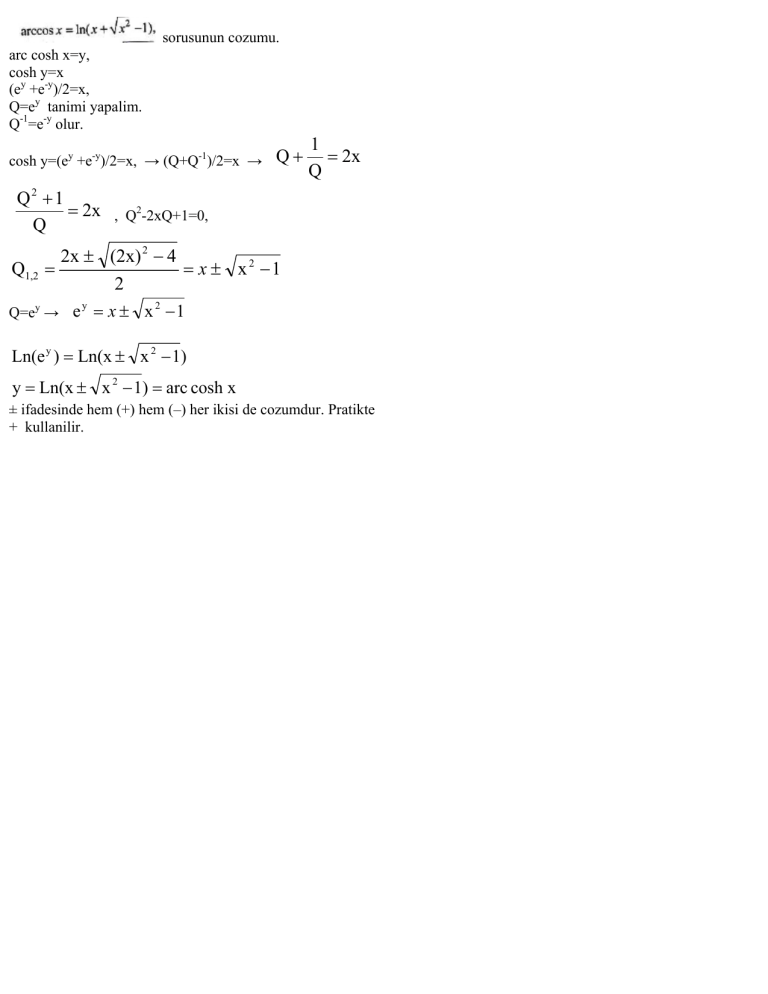
sorusunun cozumu.
arc cosh x=y,
cosh y=x
(ey +e-y)/2=x,
Q=ey tanimi yapalim.
Q-1=e-y olur.
cosh y=(e +e )/2=x, → (Q+Q )/2=x → Q +
y
-y
-1
1
= 2x
Q
Q2 + 1
= 2x , Q2-2xQ+1=0,
Q
2x ± (2x) 2 − 4
Q1,2 =
= x ± x2 −1
2
y
2
Q=ey → e = x ± x − 1
Ln(e y ) = Ln(x ± x 2 − 1)
y = Ln(x ± x 2 − 1) = arc cosh x
± ifadesinde hem (+) hem (–) her ikisi de cozumdur. Pratikte
+ kullanilir.
df -1 (x)
1
=
df
dx
dx x → f −1 ( x )
Ters fonk turevleri.
df -1 (x)
1
=
df
dx
dx x → f −1 ( x )
Ters trigonometrik turevler.
tan(arc tan x)=x
sin(arc sin x)=x
cos(arc cos x)=x
P711): f(x)=x3, f -1(x)= x1/3, (f -1)'=?
d ( x1 / 3 )
1
1
1
=
=
=
dx
3( x1 / 3 ) 2
d (x3 )
3x 2
1/ 3
x→ x
dx x → x1/ 3
(f-1)' =(1/3)x-2/3
Bildigimiz yontemle cozersek.
[x1/3] ' =1/3 x1/3-1=1/3 x-2/3
bulunur.
---------------------------- ------------p772) f(x)=x2, (f -1)' =?
1
=
2
( x )'
x→ x
1
2 x x→
=
x
tan2 x =(tan x)2
tan x2 ≠ tan2 x
tan2 (arc tan x) =[tan (arc tan x)]2 =x2
tan3 (arc tan x) =x3
sin2 (arc sin x) =x2
cos2 (arc cos x) =x2
df -1 (x)
1
=
df
dx
dx x → f −1 ( x )
( x )' =
arc tan(tan x)=x
arc sin(sin x)=x
arc cos(cos x)=x
sin (arc cos x) =?
sin (arc tan x) =?
tan (arc sin x) =?
Bu durumda ic ve disi ayni yapmaya calisiriz.
Once temel trigonometrik bagintilari hatirlamamiz lazim.
1
2 x
Bildigimiz yolla cozersek.
sin x
sin x
[x1/2] ' =1/2 x1/2-1=1/2 x-1/2
------------------------p772) f(x)=x5+x, (f -1)' (2)=?
f(x)=x5+x, f -1(x)=?
f -1(x)bilmiyoruz. Hesaplamasi da kolay degil. Fakat soruda
sadece f -1(x) in turevinin x=2 deki degeri soruluyor.
df -1 (x)
1
=
df
dx
dx x → f −1 ( x )
( f −1 ( x ))' =
1
( x + x )'
=
5
x→ f
−1
( x)
-1
1
(5 x + 1)
=
4
x→ f
−1
( x)
1
,
5[ f ( x )]4 + 1
−1
f (2)=?
x5+x=2, x=?
x=1 koklerden birisidir. o halde f -1(2)=1 alabiliriz.
1
1
( f ( 2))' =
= ,
4
5[1] + 1 6
−1
cos x
1 − cos 2 x
cos x
1 − sin 2 x
tan x
tan x
1 + tan 2 x
1
1 + tan 2 x
tan x
sin x
1 − sin 2 x
1 − cos 2 x
cos x
p33) sin (arc cos x) =?
sin (arc cos x) = 1 − cos 2 (arc cos x) = 1 − x 2
benzer sekilde
p34) cos (arc sin x) = 1 − sin 2 (arc sin x) = 1 − x 2
p35) sin (arc tan x) =?
sin x =
tan x
oldugundan
1 + tan x
2
sin (arc tan x) =
tan(arctan x )
1 + tan 2 (arctan x )
sin (arc tan x) =
x
1+ x2
olarak bulunur.
p37) cos (arc tan x)=?
cos x =
1
1 + tan 2 x
oldugundan
cos (arc tan x) =
cos (arc tan x) =
1
1 + tan (arctan x )
1
2
1+ x2
421)f(x)=arc sin x ise f '(x)=?
f -1 (x)
1
=
df
dx
dx x → f −1 ( x )
f(x)=sin x, f -1(x)=arc sin x
(arcsin x )' =
=
=
=
1
(sin x)' x → arcsin x
1
cos x x→ arcsin x
1
cos (arcsin x )
1
1− x2
422)f(x)=arc cos x ise f '(x)=?
(arccos x )' =
1
(cos x)' x → arccos x
=
=
=
1
- sin x x→ arccos x
1
- sin (arccos x )
1
− 1− x2
423)f(x)=arc tan x ise f '(x)=?
(arctan x )' =
1
(tan x)' x → arctan x
=
1
(1 + tan x)
2
x→ arctan x
=
1
(1 + tan (arc tanx)
=
1
1+ x2
2
